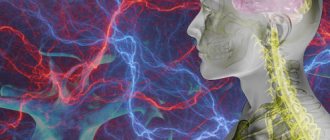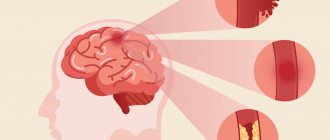Essential tremor is a fairly common hereditary disease of the central nervous system that can occur in children, but mainly develops in older people. The only manifestation of this disease is trembling. Tremors with essential tremor have different localization, severity, prevalence, characteristics and age of onset. Tremors of the head, hands, and tongue are most often observed. Lip tremor is slightly less common in adults.
Characteristic
Numbness of the lips, or scientifically “paresthesia,” is a loss of sensitivity in the upper layers of the epidermis on any part of the face. This condition can occur due to a number of reasons. The main factor provoking the formation of the symptom is a strong weakening of the patient’s immune system.
The manifestation of such symptoms signals the development of some problem in the body. If the upper lip is numb, this indicates a lack of vitamins or microelements in the internal organs. The disease can act as a side effect from previously suffered serious illnesses.
The development of paresthesia is triggered by problems in the conduction of nerve endings. The latter belong to different parts of the central nervous system of sensitive or peripheral types.
The disease affects elderly people or patients with a predisposition to the pathological process. People who are often in stressful situations or have problems with teeth or gums complain of loss of sensitivity in the upper layers of the epidermis. Numbness is observed in patients with neurotic disorders or in those patients who have endocrine diseases.
If there is numbness of one lip or both at once, the warmth of the fingers and pain are not felt when touching. In this case, there is sensitivity of the skin on the lips when touched or pressed with fingers. The process develops due to damage or irritation of nerve endings, and can also be triggered by disturbances in the circulatory system.
If numbness appears in one area for a long period of time and does not go away, then loss of sensitivity is a sign of complete death of nerve endings. Therefore, if discomfort occurs on the skin of the face, it is recommended not to hesitate, but to immediately consult a doctor.
Various localizations
More than 50% of patients suffer from head tremors. Often, it is from this localization that the disease begins, and later trembling of the limbs occurs. The head most often moves left and right, less often - down and up, in a circle or diagonally.
Quite often, patients suffer from facial muscles - trembling of the lower lip develops in adults when smiling or talking. Tremor can also manifest itself as isolated, rapid, small twitches of the facial muscles. This type of tremor can occur at an early stage of the disease.
In addition, patients may experience mild tremor of the tongue or eyelids.
Elderly and middle-aged patients who have had the disease for more than 10 years may experience a trembling voice. Sometimes this symptom also occurs in younger people (up to 20 years old) with a disease duration not exceeding 5 years.
Almost a quarter of patients experience trembling of the lower extremities.
Trembling of the entire body is observed in rare cases, most often after physical exertion or emotional outbursts. This symptom may indicate the spread of the disease.
In a small number of patients, diaphragmatic trembling is observed, which can be confirmed by x-ray. When a combination of tremor of the tongue, lips, diaphragm and vocal cords occurs, speech and breathing rhythm may be disrupted.
Regardless of location, trembling intensifies with excitement, significant physical exertion, and hypothermia. When drinking alcohol, there is a decrease in tremor, but it intensifies the next day.
There is a childhood and youthful form of tremor, as well as a form of mature and senile age.
The disease is often diagnosed in patients of childhood and adolescence.
Essential tremor is benign: it does not pose a threat to the patient’s life, but it is constantly progressing, so this disease cannot be ignored.
Doctors at the Neurology Clinic of the Yusupov Hospital provide assistance to patients with essential tremor, aimed at eliminating symptoms that significantly worsen the quality of life of patients. The clinic provides high-quality drug therapy and physiotherapeutic procedures that significantly improve the patient’s condition.
Causes
To prescribe treatment, it is necessary to determine exactly why the lips are numb. The root causes of the development of the problem include a number of diseases, ranging from diseases of the endocrine system to the body’s response to external stimuli.
There are the following reasons for numb lips:
- Cervical osteochondrosis - in a pathological condition, compression of the spinal cord occurs. The problem develops due to prolonged muscle tension or due to the displacement of one or more vertebrae.
What happens leads to changes in the flow of blood to the main internal organs and the upper layers of the epidermis: a lack of oxygen and other nutrients develops in the brain.
As the disease progresses, additional symptoms include dizziness, the presence of a crunching sound during rotational movements, and pain in the cervical vertebrae. In addition to loss of sensitivity in the lips, tingling of the upper layers of the epidermis near the mouth is detected, and numbness in the arms and legs is often present.
- Vitamin B deficiency in the body - loss of sensitivity most often indicates problems in the nervous system. In some situations, the cause of the development of malaise is a lack of vitamins, in particular from group B.
Additional signs of the pathology are fatigue, sleep disturbances, the scalp loses its original appearance, and the hair becomes brittle and lifeless. A stressful state arises, problems with the perception of the outside world are identified, vision is impaired, and short-term memory deteriorates.
- Facial nerve neuritis is a fairly common pathology. Its first sign is numbness of the lower and upper lips. Neuritis is formed due to disturbances in the functioning of nerve impulses. The latter are directed by the brain to the facial muscles, but do not carry out the desired effect.
If such a disease develops, you need to start therapy and do not hesitate to visit a doctor. Especially if there is an accompanying clinical picture: pain near the auricle, eyelids do not close completely.
Diagnosis reveals asymmetrical facial features. In the absence of treatment, the affected area gradually spreads: the eyebrows become numb, the upper layers of the epidermis undergo changes, which causes the skin to shrink.
- Diabetes mellitus - the formation of the disease is indicated by numbness of the lips and part of the upper layers of the epidermis of the face, as well as the patient’s limbs. In addition, symptoms include: fatigue, weakness, vision problems, sudden weight loss, long and difficult regeneration of the skin.
- Migraine often occurs with a fast pace of life, constant problems at work and periodic exposure to stressful situations. This leads to disturbances in the functioning of the nervous system, which causes severe headaches, sometimes accompanied by problems with sensitivity on the face.
- Jumps in blood pressure provoke numbness not only of the lips, but also of the tongue, as well as the limbs. When pressure increases or, conversely, a sharp decrease, there is severe pain in the head, dizziness, the patient may feel nauseous, and the face begins to swell. To normalize the condition, an ambulance should be urgently called. Once the hypertension is eliminated, the numbness should disappear.
- Drug allergic reaction - when changing the current drug, there is a possibility of an allergy to the drug as a whole or its components. The skin may not only become numb, but also swell and change color.
Therefore, in order not to provoke an allergy, the medication is initially tested. To do this, administer a minimum dose of the drug at the first dose.
- Diseases of the teeth or gums - with inflammation of the oral cavity, the tongue and lips often become numb. In such a situation, there is no danger to the patient’s life, but you should seek treatment from a dentist. Lack of sanitation leads to the appearance of gumboil or complete loss of the tooth.
- Glossalgia is a painful process that occurs in the oral cavity. As the problem develops, the patient finds it difficult to speak, the jaw moves poorly, and words are incomprehensible. The disease occurs more often in women after 40 years of age; men suffer from the disease extremely rarely.
- Shingles - the first signs of the disease are chills and itching. A person feels that the skin on his cheeks is cramping. You should immediately seek treatment from a doctor. Leaving the problem without treatment is strictly prohibited.
- Bell's palsy - signs of the formation of paralysis are numbness of the eyebrows and lips. The surface of the face that has not undergone loss of sensitivity begins to tingle. With the rapid development of the pathological process, the disease completely covers the entire face.
Only a doctor can accurately determine the cause of loss of skin sensitivity after a thorough diagnosis.
Loss of sensitivity only on the lower lip indicates the development of osteochondrosis, neuropathy of the trigeminal nucleus, inflammation of the gums, and a pathological process in the tooth. When the upper lip is numb, problems such as an abscess, gumboil, or the development of caries are recorded.
When the lips and tongue become numb, it is necessary to resort to sanitation of the oral cavity, conduct tests for an allergic reaction, determine the presence or absence of problems with blood flow in the brain, and also identify the possibility of developing a disease of the facial nerve. In some situations, pathology indicates the formation of neoplasms of various etiologies located in the brain.
If the patient complains of numbness in the tip of the tongue, this indicates hypoglycemic syndrome in the patient. Against the background of the pathology, nervousness, headaches, and constant hunger develop. Over time, the symptoms intensify. To eliminate discomfort, you should eat complex carbohydrates contained in foods such as cabbage, grapes, herbs, zucchini, peppers and suck on a piece of sugar.
Sometimes numbness is observed only on one side. This pathology is detected as a result of neuritis of the facial nerve.
If there is a loss of sensitivity in the corner of the mouth, the cause of the development of the anomaly may be hypothermia, lack of vitamins or overwork. In any case, even if the problem lies only in nutritional deficiency, you should consult a doctor and get diagnosed.
Symptoms
Numbness of the lips, regardless of the ongoing pathological processes in the body, is accompanied by the following symptoms:
- Feeling of “goosebumps” in the upper layers of the epidermis of the face;
- Itching or burning on the lower or upper lip;
- Changes in pigmentation in the area where tingling or numbness of the skin is felt;
- Loss of sensation extends to the cheeks, chin, nose and mouth;
- The skin feels cool;
- Painful sensations appear;
- Tingling in the upper layers of the skin.
For each disease, the symptoms are supplemented by certain signs that are unique to this disease. Therefore, it is important to determine the root cause and begin to treat it. Otherwise, irreversible consequences may develop, including loss of sensitivity of the entire face.
Diagnostics
The doctor will be able to identify the cause of the formation of a pathological condition on the face only after laboratory tests and tests. First of all, the doctor interviews the patient, collects an anamnesis of the problem, and carefully examines the patient both visually and by palpation.
To compile a detailed clinical picture, the following are prescribed:
- General urine analysis;
- Blood test - general and biochemical;
- Toxicological examination of lymph;
- Doppler and rheovasography;
- Ultrasound and X-ray;
- Magnetic resonance and computed tomography.
Based on the results of the examination, the reasons why the lower lip, as well as the upper or corners of the mouth, are numb are revealed. Based on the test results, the therapist refers the patient for further consultation to specialized specialists, such as an otolaryngologist, oncologist, dermatologist, neurosurgeon, dentist, orthopedist or endocrinologist.
Treatment
Patients with mild manifestations of essential tremor do not need drug treatment. To eliminate tremors of one or another part of the body, they just need to give up caffeine-containing drinks (coffee, tea), eliminate alcohol and smoking, increase physical activity, time spent in the fresh air and avoid stress.
In case of severe essential tremor, drug treatment is prescribed. Timely initiation of therapy improves its effectiveness.









